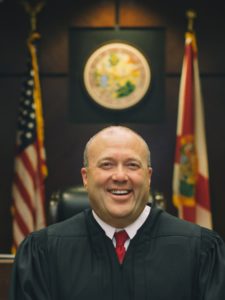
Newtonian physics and violations of probation
Ask Judge Smith
 Judge Layne Smith
Judge Layne Smith
Q. Judge Smith, what is probation, how it is enforced, and is it fair? Thank you, Phyllis
A. Phyllis, probation is the post-sentence period when the defendant is supervised and he or she must fulfill certain conditions requiring either action, self-control, or restraint. At least 95 percent of the people on probation chose it by entering into negotiated plea agreements in lieu of jail or prison sentences.
Let’s use two examples to explain the concept. First, suppose the state charges a defendant with committing a battery by punching his former girlfriend. Assume he is employed and has no prior criminal record. Rather than sentencing him to jail, he is placed on 12 months of probation.
During that time, he must perform 75 hours of community service work, complete an anger management course, and have no direct or indirect contact with the victim. In addition, he must refrain from further criminal activity and pay the victim restitution to cover her medical bills. The goal is to punish the defendant, discourage future violent outbursts, and teach him to control his impulses. Probation protects the victim, too.
Second, suppose the state charges a defendant with driving under the influence of alcohol to the extent that her normal faculties were impaired. Rather than sentencing her to jail, she is placed on six months of probation. During that time, she must perform 50 hours of community service, not consume any alcohol, complete a driving-while-impaired deterrence class, complete a victim awareness program; have her vehicle impounded or immobilized for 10 days, and refrain from further criminal activity.
By statute, her driver’s license will be revoked for a period of six months. The goal is to get her alcohol consumption under control, focus her attention on the carnage that impaired drivers cause, and discourage her from driving again while impaired. This protects the rest of us, too.
Defendants are assigned probation officers who supervise their progress and compliance. After defendants fulfill all conditions, their probation is terminated. If they don’t fulfill the conditions of their probation, the state may charge them with a violation of probation, which it must prove by the greater weight of the evidence.
According to Isaac Newton’s third law of motion, if you push against an object, the object will push back with an equal and opposite force. By analogy, defendants who commit knowing and material violations of probation experience an equal and opposite push back by the courts.
Courts don’t expect perfection. Defendants who err but give their best effort and are honest tend to do all right. Courts take into consideration defendants’ ability to pay restitution, and unpaid amounts can be reduced to civil judgments. Those who give little to no effort, or lie about it, reap the whirlwind.
Probation is fair. It often provides the structure and incentive some people need to succeed, and most people fulfill their obligations. For those who don’t, courts can nullify their prior advantageous sentences and impose harsher sentences instead.
The Honorable J. Layne Smith is a Leon County Judge. Email your questions to askjudgesmith@gmail.com.







